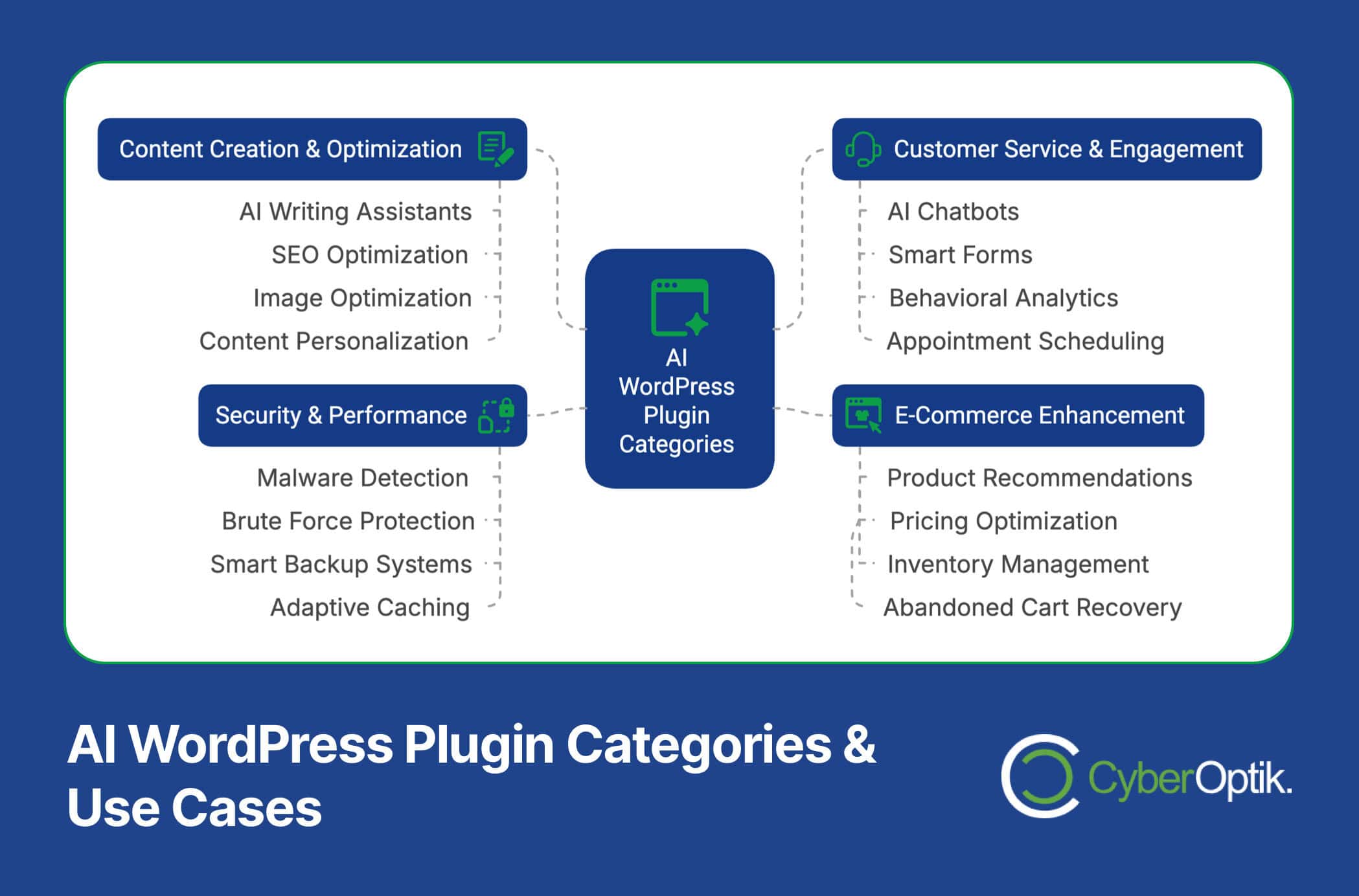Artificial intelligence is transforming WordPress websites. Business owners can now automate tedious tasks, personalize user experiences, and gain valuable insights without coding knowledge. These powerful AI tools are changing how websites function and perform.
As a business owner, you face constant pressure to maintain an effective online presence. Your website needs to attract visitors, convert leads, and operate smoothly—all while you focus on running your business. This is where AI WordPress plugins shine.
In this guide, we’ll explore the best AI plugins for WordPress. You’ll discover how these tools can save time, boost performance, and give your business a competitive edge. Let’s dive into the world of WordPress AI.
Understanding AI Plugins for WordPress
AI WordPress plugins integrate artificial intelligence capabilities into your website. These tools use machine learning, natural language processing, and data analysis to automate tasks and improve website functionality. They represent the next evolution in WordPress development.
The WordPress ecosystem thrives on plugins, with statistics showing there are over 59,000 free plugins available in the WordPress directory. (Source: ThemeIsle). This massive marketplace now includes numerous AI-powered options designed to solve specific business problems.
AI plugins work by collecting data, learning patterns, and executing actions based on that learning. Unlike traditional plugins that follow fixed rules, AI plugins adapt and improve over time. This creates increasingly personalized and efficient website experiences.
We can categorize WordPress AI plugins into several key types:
- Content generation and optimization – Creates and enhances website text, images, and SEO
- User experience personalization – Tailors content and design based on visitor behavior
- Customer service automation – Powers chatbots and support systems
- Security and performance – Identifies threats and optimizes site speed
- E-commerce enhancement – Improves product recommendations and sales processes
For Chicago businesses across industries, these tools offer significant advantages. Whether you run a law firm, healthcare practice, or real estate agency, AI plugins can help overcome common website challenges while reducing the technical burden on your team.
Benefits of AI WordPress Plugins for Business Owners

AI plugins transform how your WordPress site operates. They deliver concrete business benefits that directly address the challenges faced by Chicago business owners. Let’s examine the most significant advantages.
Time savings tops the list for most businesses. Website management demands constant attention—updating content, responding to visitors, monitoring performance, and addressing security concerns. AI automates many of these tasks, freeing you to focus on core business activities.
Enhanced user experience represents another critical benefit. Studies consistently show that website visitors expect personalized, responsive experiences. AI plugins track user behavior and preferences, then automatically adjust content, recommendations, and navigation to match individual needs.
The data-driven insights these plugins provide prove invaluable. Traditional analytics tell you what happened on your site. AI analytics explain why it happened and predict what will happen next. This empowers better business decision-making.
| Benefit Category | Traditional WordPress | With AI Plugins | Business Impact |
|---|---|---|---|
| Time Management | Manual content updates, moderation, and optimization | Automated content generation, scheduled updates, smart moderation | 50-70% reduction in content management time |
| User Experience | One-size-fits-all content and recommendations | Personalized content, smart recommendations, adaptive interfaces | Increased engagement and return visits |
| Performance | Manual optimization and troubleshooting | Automatic image optimization, smart caching, predictive maintenance | Faster loading times, better user retention |
| Lead Generation | Static forms and fixed conversion paths | Dynamic forms, personalized conversion funnels, smart lead scoring | Higher conversion rates and lead quality |
This comparison highlights how AI plugins address key business challenges. The performance improvements alone often justify the investment in these tools.
Cost-effectiveness stands out as another significant advantage. While premium AI plugins require investment, they typically cost far less than hiring specialized staff or custom development. For small to medium-sized Chicago businesses, this provides access to enterprise-level functionality on reasonable budgets.
Security enhancements represent a critical but often overlooked benefit. WordPress websites face constant security threats, with research showing that 83% of CMS-based hacks target WordPress sites due to their market dominance. (Source: WPBeginner). AI security plugins continuously monitor for threats, identify unusual patterns, and automatically address vulnerabilities.
Competitive advantage may be the most compelling benefit. As AI adoption grows, businesses using these tools gain significant advantages over competitors relying on traditional website approaches. This technology gap widens over time as AI systems learn and improve.
Top AI Plugins for Content Creation and Optimization
| Plugin Name | Primary Function | Key Features | Best For |
|---|---|---|---|
| Rank Math AI | SEO Optimization | AI-powered content analysis, keyword suggestions, readability scoring | Businesses focused on improving search rankings |
| WordLift | Content Enrichment | Entity-based SEO, automated schema markup, content recommendation | Content-heavy websites needing semantic SEO |
| Anyword | Content Generation | AI copywriting, performance prediction, custom templates | Marketing teams needing diverse content types |
| Bertha.ai | WordPress-specific AI writing | 30+ writing templates, long-form editor, SERP analysis | WordPress-focused businesses creating regular content |
This table highlights top performers in the content AI space. Each offers unique strengths depending on your specific business needs.
Image and multimedia optimization plugins deserve special mention. AI tools can automatically resize images, compress files without quality loss, and even generate alt text. This improves both site performance and accessibility—critical factors for fixing website performance problems.
Content personalization represents one of the most powerful applications. These plugins track user behavior and preferences, then automatically adjust what content appears for different visitors. This creates more relevant experiences without requiring manual segmentation.
For businesses constantly publishing content, AI scheduling and optimization tools provide significant value. They can analyze best posting times, suggest content refreshes, and even automatically update seasonal information. This maintains freshness with minimal oversight.
AI Plugins for Customer Service and Engagement
Customer service automation transforms how businesses interact with website visitors. AI chatbots lead this revolution, providing instant responses to common questions around the clock. This improves visitor satisfaction while reducing support burdens.
Modern AI chatbots go far beyond simple scripted responses. They understand natural language, learn from conversations, and continuously improve their accuracy. Some can even detect customer sentiment and escalate to human agents when necessary.
Customer analytics tools provide deeper insights into visitor behavior. These plugins track interactions, identify patterns, and suggest improvements to the customer journey. The resulting data helps businesses refine their entire approach to customer engagement.
| Plugin Category | Functionality | Business Benefits | Implementation Complexity |
|---|---|---|---|
| AI Chatbots | Automated conversations, FAQ handling, lead qualification | 24/7 support coverage, instant response times, reduced support costs | Low to Medium |
| Smart Forms | Dynamic field generation, predictive completion, abandonment prevention | Higher form completion rates, better lead quality, improved data collection | Low |
| Behavioral Analytics | User journey mapping, intent prediction, engagement scoring | Better understanding of customer needs, improved conversion optimization | Medium |
| Feedback Analysis | Sentiment analysis, automatic categorization, trend identification | Actionable customer insights, faster response to issues, product improvement data | Medium |
This breakdown shows how different AI engagement tools address specific business needs. The relatively low implementation complexity makes these accessible for most WordPress sites.
Personalization plugins work alongside these tools to create tailored experiences. They adjust content, offers, and navigation based on user profiles and behavior. This relevance increases engagement and conversion rates across industries.
For service businesses like law firms, healthcare providers, and consultancies, appointment scheduling AI offers particular value. These tools intelligently manage availability, reduce double-bookings, and send smart reminders. This creates a smoother client experience while reducing administrative work.
Social media integration plugins use AI to streamline cross-platform engagement. They can suggest optimal posting times, recommend content adjustments for different platforms, and even generate platform-specific versions of your content. This maintains consistent brand messaging with less effort.
AI Plugins for E-Commerce Enhancement
E-commerce businesses gain exceptional advantages from AI WordPress plugins. These tools enhance every aspect of the online shopping experience, from product discovery to checkout optimization. The results directly impact revenue and customer satisfaction.
Product recommendation engines stand among the most valuable AI implementations. These systems analyze browsing history, purchase patterns, and product relationships to suggest relevant items. Effective recommendations can significantly increase average order value and customer lifetime value.
Pricing optimization tools help businesses maximize profitability. They analyze market conditions, competitor pricing, inventory levels, and purchase patterns to suggest optimal price points. This dynamic approach outperforms static pricing strategies, especially in competitive markets.
Inventory management becomes more intelligent with AI. These plugins predict demand patterns, identify reorder points, and flag potential stock issues before they impact sales. This reduces both stockouts and excess inventory costs.
| E-commerce AI Feature | Description | Business Impact | Business Impact |
|---|---|---|---|
| Smart Product Recommendations | Personalized product suggestions based on user behavior and purchase history | 10-30% increase in average order value | 10-30% increase in average order value |
| Visual Search | Allows customers to search by uploading images rather than text | Improved discovery for visually-driven products | Improved discovery for visually-driven products |
| Abandoned Cart Recovery | Intelligent retargeting with personalized incentives | Recovery of 10-15% of abandoned carts | Recovery of 10-15% of abandoned carts |
| Customer Lifetime Value Prediction | Forecasts long-term value of customers to inform marketing strategy | More efficient marketing spend and targeting | More efficient marketing spend and targeting |
The table above highlights e-commerce AI features with particularly strong ROI potential. Each addresses specific friction points in the online shopping experience.
Conversion optimization represents another powerful application. AI plugins can test different layouts, messages, and purchase flows, then automatically implement the best-performing versions. This ongoing optimization leads to steadily improving results without constant manual adjustment.
Fraud detection and prevention tools offer critical protection for both businesses and customers. These systems identify suspicious patterns, flag potential issues, and help prevent chargebacks. The protection helps maintain customer trust while safeguarding your business.
Customer segmentation becomes more sophisticated with AI plugins. They identify natural groupings based on behavior rather than simple demographics. This enables highly targeted marketing campaigns that resonate with specific customer types and needs.
AI Plugins for Website Security and Performance
Website security represents a critical concern for businesses. AI security plugins offer advanced protection against evolving threats. These tools continuously monitor for suspicious activities, block potential attacks, and strengthen your site’s defenses.
Traditional security approaches rely on known threat signatures. AI security goes further by identifying unusual patterns that may indicate new attack methods. This proactive approach helps protect against zero-day exploits and emerging threats.
WordPress sites face significant security challenges, with research showing that 50% of vulnerabilities stem from outdated plugins and themes. (Source: HubSpot). AI security plugins can automatically identify these vulnerabilities and either update components or restrict access to protect your site.
Performance optimization represents another area where AI excels. These plugins analyze how your site functions, identify bottlenecks, and automatically implement improvements. The result is a faster, more responsive website—a key factor in both user experience and search rankings.
| Security/Performance Category | Traditional Approach | AI-Enhanced Approach | Business Advantage |
|---|---|---|---|
| Malware Detection | Signature-based scanning on fixed schedules | Behavioral analysis, anomaly detection, continuous monitoring | Early detection of novel threats, reduced infection time |
| Brute Force Protection | Basic login attempt limitations | Pattern recognition, IP reputation analysis, adaptive restrictions | Stronger protection with fewer false positives |
| Image Optimization | Standard compression algorithms | Content-aware compression, format selection, automatic resizing | Better image quality at smaller file sizes |
| Caching Strategy | Static rules-based caching | User-pattern adaptive caching, predictive preloading | Faster page loads with fewer cache misses |
This comparison demonstrates how AI approaches outperform traditional methods in both security and performance optimization. The business advantages directly impact both operations and customer experience.
Backup and recovery tools benefit significantly from AI capabilities. Smart backup systems learn which content changes most frequently and adjusts backup schedules accordingly. This ensures critical data protection while minimizing server load and storage requirements.
Traffic management becomes more intelligent with AI plugins. These tools distinguish between legitimate users and potential threats, then allocate resources accordingly. During traffic spikes, they prioritize important functions and visitors to maintain core site functionality.
As search engines increasingly favor fast, secure websites, these AI tools directly contribute to your SEO efforts. They help create the technical foundation that allows your content to rank well and attract more visitors.
Implementation Best Practices for AI WordPress Plugins
Selecting the right AI plugins requires careful consideration. Not all options deliver equal value, and implementation quality significantly impacts results. Let’s explore how to choose and implement these tools effectively.
Start with a clear business goal. Define exactly what you want to achieve before selecting any plugin. This focus helps you evaluate options based on your specific needs rather than just feature lists or marketing claims.
Research thoroughly before committing. Look for plugins with strong reviews, regular updates, and responsive support. Check compatibility with your WordPress version and other plugins. This due diligence prevents many common implementation problems.
Consider these key selection criteria:
- Data handling and privacy – How does the plugin use your site and customer data?
- Performance impact – Will the plugin slow down your site?
- Customization options – Can you adjust the AI behavior to match your brand and needs?
- Learning curve – How difficult is implementation and ongoing management?
- Integration capabilities – Does it work well with your existing tools and workflows?
After selection, proper implementation becomes critical. Start with a staging environment rather than your live site. This allows you to test functionality, check for conflicts, and resolve issues before affecting your visitors.
Training staff properly ensures you maximize value from AI plugins. Provide clear documentation and training on how to work with the new tools. This initial investment in education yields better long-term results.
Regular monitoring and optimization maintain performance. AI plugins learn and improve over time, but they still require oversight. Schedule regular reviews to assess effectiveness and make adjustments as needed.
| Implementation Stage | Common Mistakes | Best Practices |
|---|---|---|
| Pre-Installation | Choosing plugins based only on marketing claims; ignoring compatibility issues | Define specific goals; research thoroughly; check compatibility; read reviews from similar businesses |
| Installation | Installing directly on live site; activating multiple AI plugins simultaneously | Use staging environment first; implement one plugin at a time; follow setup wizards completely |
| Configuration | Using default settings; ignoring customization options | Align settings with business goals; customize to match brand voice; start with conservative settings |
| Ongoing Management | Set-and-forget approach; ignoring analytics | Monitor performance metrics; schedule regular reviews; update as needed; refine based on results |
This implementation roadmap helps avoid common pitfalls while maximizing the value of your AI plugin investment. Following these guidelines leads to better integration and results.
For Chicago businesses with limited technical resources, consider working with a professional web design company that specializes in WordPress. Their expertise can ensure proper implementation and integration with your overall digital strategy.
Future Trends in AI for WordPress
The landscape of AI WordPress plugins continues to evolve rapidly. Understanding emerging trends helps businesses stay ahead and make strategic technology decisions. Several key developments will shape the next wave of WordPress AI.
Voice interaction represents one of the most significant trends. As voice search and commands become more common, WordPress plugins will increasingly support voice-based content discovery and site navigation. This creates more accessible, hands-free website experiences.
Predictive analytics will grow more sophisticated. Future plugins will not only report what happened but forecast visitor behavior with increasing accuracy. This allows for proactive content and feature adjustments before users even express needs.
Content creation capabilities will expand dramatically. While current AI can generate basic content, future tools will produce increasingly sophisticated, creative, and brand-aligned materials. This will transform content marketing approaches for businesses of all sizes.
Integration across the entire marketing ecosystem will deepen. AI plugins will work seamlessly with CRM systems, email marketing platforms, social media, and advertising networks. This creates unified customer experiences across all touchpoints.
| Emerging Technology | Current Status | Future Impact | Business Preparation |
|---|---|---|---|
| Advanced Natural Language Processing | Basic content generation and analysis | Human-quality content creation, perfect sentiment analysis | Focus on strategic direction rather than routine content |
| Computer Vision | Basic image recognition and optimization | Complete visual content understanding and creation | Build image-rich content libraries; improve visual branding |
| Hyper-Personalization | Segment-based personalization | Individual-level content and experience customization | Collect clean, ethical user data; develop personalization strategy |
| Autonomous Site Management | Automated tasks with human oversight | Self-optimizing websites with minimal intervention | Document business rules and preferences for AI guidance |
This forecast highlights technologies with significant business implications. Preparing for these developments now creates competitive advantage as they mature.
Privacy and ethical considerations will become increasingly important. As AI capabilities grow, so will the responsibility to use these tools ethically. Future plugins will need to balance personalization with privacy in an increasingly regulated environment.
Accessibility improvements represent a positive trend. AI will help make websites more usable for people with disabilities by automatically enhancing compatibility with assistive technologies. This supports both inclusivity goals and legal compliance.
For Chicago businesses planning their digital strategy, these trends suggest focusing on flexible, future-ready WordPress implementations. Working with forward-thinking partners like CyberOptik helps ensure your website can adopt emerging AI capabilities as they become available.
Conclusion: Transforming Your WordPress Site with AI
AI plugins represent a transformative opportunity for WordPress websites. They automate routine tasks, enhance user experiences, and provide valuable insights that drive business results. For Chicago business owners, these tools offer accessible ways to stay competitive in an increasingly digital marketplace.
The benefits extend across industries and business types. Whether you run a service business, e-commerce store, or content-focused site, appropriate AI plugins can enhance performance while reducing your technical burden. The key lies in strategic selection and proper implementation.
Start small and scale gradually. Begin with one or two AI plugins that address your most pressing business challenges. Monitor results, learn from the implementation, and expand your AI toolkit as you build comfort and expertise with these technologies.
As WordPress continues its dominance, powering 43.5% of all websites according to recent statistics, AI integration becomes increasingly important. (Source: WPZoom). The platforms that efficiently leverage artificial intelligence will create better experiences and achieve stronger results.
Ready to explore how AI WordPress plugins can transform your business website? Contact our team for a personalized consultation. We’ll help identify the right AI solutions for your specific goals and implement them effectively on your WordPress site.
Frequently Asked Questions
Are AI WordPress plugins secure?
Quality AI plugins from reputable developers maintain strong security standards. However, as with any plugin, it’s important to research thoroughly, read reviews, and ensure regular updates. Choose plugins that clearly explain their data handling practices and privacy policies.
How much technical knowledge do I need to use AI WordPress plugins?
Most AI WordPress plugins are designed with non-technical users in mind. They typically offer user-friendly interfaces and setup wizards. While basic WordPress familiarity helps, you generally don’t need coding skills or technical expertise to benefit from these tools.
Will AI plugins slow down my website?
Well-designed AI plugins optimize their resource usage and minimize performance impact. Some may actually improve site speed by automating optimizations. Before installation, check performance reviews and test new plugins on a staging site to ensure they don’t negatively affect loading times.
Can AI plugins replace human content creators?
Current AI content tools work best as assistants rather than replacements. They excel at generating drafts, creating routine content, and suggesting improvements. Human oversight remains essential for strategic direction, creative insights, and ensuring content truly connects with your audience.
How do I measure the ROI of AI WordPress plugins?
Track relevant metrics before and after implementation. For content plugins, monitor traffic, engagement, and conversion rates. For customer service tools, track response times and satisfaction scores. For e-commerce plugins, measure conversion rates and average order values. Compare the performance improvements against the plugin costs to calculate ROI.




